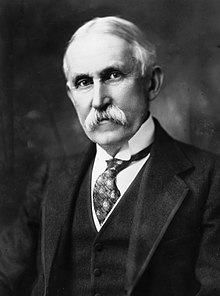Franklin MacVeagh
| Franklin MacVeagh | |
|---|---|
 |
|
| 45th United States Secretary of the Treasury | |
|
In office March 8, 1909 – March 5, 1913 |
|
| President |
William Howard Taft Woodrow Wilson |
| Preceded by | George B. Cortelyou |
| Succeeded by | William G. McAdoo |
| Personal details | |
| Born |
November 22, 1837 Phoenixville, Pennsylvania, United States |
| Died | July 6, 1934 (aged 96) Chicago, Illinois, United States |
| Resting place | Graceland Cemetery in Chicago, Illinois, United States |
| Political party | Republican |
| Spouse(s) | Emily Eames MacVeagh |
| Relations |
Isaac Wayne MacVeagh U.S. Attorney General |
| Parents | John MacVeagh Margaret Lincoln MacVeagh |
| Alma mater | Yale University, Columbia Law School |
| Profession | Politician, Lawyer, Grocer, Banker |
| Religion | Methodist |
Franklin MacVeagh (November 22, 1837 – July 6, 1934) was an American politician, lawyer, grocer and banker. He served as the United States Secretary of the Treasury under President William Howard Taft.
MacVeagh was born on November 22, 1837, in Phoenixville, Pennsylvania, to Major John MacVeagh and the former Margaret Lincoln. His brother, Isaac Wayne MacVeagh, became the U.S. Attorney General under Presidents James A. Garfield and Chester A. Arthur.
MacVeagh graduated from Yale University in 1858, where he was a member of Skull and Bones. He graduated from Columbia Law School in 1864. He worked as a wholesale grocer and lawyer. MacVeagh was a Methodist. He married Emily Eames in 1868; they had five children.
He had been director of the Commercial National Bank of Chicago for 29 years when President and fellow Bonesman William Howard Taft tapped him to be Secretary of the Treasury in 1909. He did not tackle the pressing problem of currency reform, leaving it to the National Monetary Commission, which had been established by the Aldrich-Vreeland Act of 1908; he did, however, stress the urgency of reform in his annual report. He is remembered for increasing the efficiency and general progressiveness of the Treasury Department: He abolished 450 unnecessary positions, rehabilitated the U.S. Customs Service with the introduction of electric automatic weighing devices and accepted certified checks instead of currency for customs and internal revenue payments. He was also involved in the creation of the buffalo nickel.
...
Wikipedia
